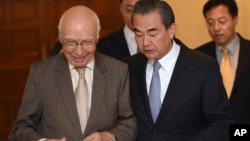China has brokered a deal between Pakistan and Afghanistan for the establishment of a bilateral “crisis management mechanism” to avoid any breakdown in mutual communications and contacts in the event of terrorist attacks on both sides of their long shared border.
The three countries have also agreed to set up a trilateral foreign minister-level dialogue forum that would allow Beijing to observe progress toward normalizing Kabul’s deeply mistrust-marred security ties with Islamabad and promoting economic cooperation
The developments were announced Sunday at the conclusion of a two-day mediation trip to Afghanistan and Pakistan by China’s Foreign Minister Wang Yi.
Beijing’s diplomatic efforts came as relations between the two uneasy neighbors have deteriorated in the past two years over mutual allegations of sponsoring terrorist attacks on each other’s soil.
The “crisis management mechanism” would enable the two sides to maintain timely and effective communications in the event of any emergencies, including terrorist attacks, allowing the two sides to resolve them through dialogue and consultation, said a joint statement Wang released at a news conference with Pakistani foreign policy adviser, Sartaj Aziz.
The Chinese foreign minister told reporters he conducted the “shuttle diplomacy” to do what China can to help improve relations between the two countries and to help facilitate the reconciliation process in Afghanistan.
Wang described the establishment of “crisis management mechanism” as an important step toward improving the relationship.
"While going forward, the key is for Pakistan and Afghanistan to have detailed consultations on how this mechanism would function and to reach early agreements on the operability of this mechanism. Pakistan and Afghanistan have in doing so sent a positive signal to the international community and China welcomes that,” Wang said.
The three parties had “in-depth exchange of views”, he explained, and they also agreed to establish the China-Afghanistan-Pakistan Foreign Ministers’ dialogue mechanism to cooperate on issues of mutual interest, beginning with economic cooperation.
The Chinese foreign minister, on behalf of the three countries, also called call on the Taliban to join the Afghan reconciliation process.
There was no immediate reaction from the Islamist insurgent group, which has repeatedly turned down peace talks with the Afghan government as long as the U.S.-led foreign forces are present in Afghanistan.
“If there is no progress in the reconciliation process in Afghanistan it will mean greater difficulty in the reconstruction process. So, it is important to advance the reconciliation process…It is also something that all the parties, including China and Pakistan, would like to see further progress,” noted Wang.
The Chinese foreign minister undertook the mediation effort at a time when the Untied States is reportedly planning to intensify its Afghan military campaign by sending fresh troops to the country.
President Donald Trump’s administration is also expected to increase pressure on Islamabad to prevent Taliban insurgents and their ally, the dreaded Haqqani network, from using Pakistani soil for deadly attacks in Afghanistan.
Pakistani leaders strongly dismiss U.S. and Afghan criticism of their counterterrorism efforts, saying the country has made “monumental sacrifices” in the war against terrorism.
China’s Foreign Minister Wang on Sunday reiterated Beijing’s traditional support for Pakistan’s stance.
“The international community should fully acknowledge and appreciate the efforts made by Pakistan in this regard. Any notion that Pakistan is not firm in counterterrorism is not fair and is not consistent with the fact,” Wang asserted.
China considers stability in Afghanistan vital to its national security and economic interests. It is worried that continued Afghan insecurity could threaten security of its western Xinjiang province, which shares border with the war-hit nation.
Beijing is investing billions of dollars in Pakistan, China's staunch ally, to establish a trade route to gain access to international markets through the Pakistani port of Gwadar on the Arabian Sea.
Afghan leaders allege sanctuaries and safe havens on Pakistani soil have enabled the Taliban to intensify insurgent attacks and prolong the Afghan war.
Islamabad denies the charges and in turn blames sanctuaries in border areas of Afghanistan for plotting terrorist attacks against Pakistan, including Friday’s deadly suicide bombings in two cities that killed more than 80 people and injured more than 200 others.
The U.S. Department of Defense in its latest report last week alleged that Taliban and Haqqani terrorists continue to use sanctuaries on Pakistani soil for staging attacks in Afghanistan.




